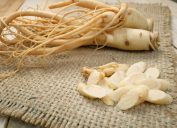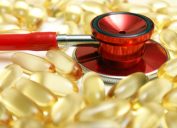4 Supplements You Should Start Taking in the Spring—And 3 You Should Stop
Doctors and dietitians recommend reevaluating your supplement schedule as the seasons change.
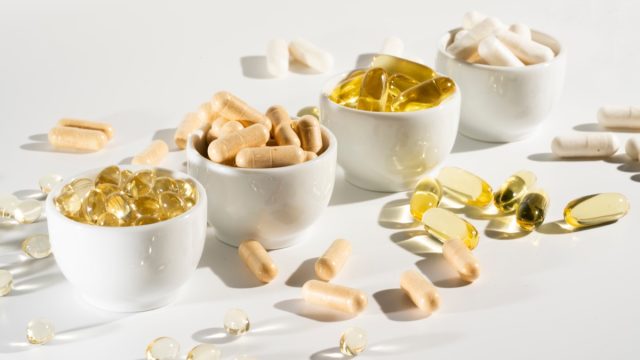
The changing seasons inspire several adjustments, including a closet refresh and maybe a clean sweep of your home. But with the longer days and balmier temperatures during the transition from winter to spring, you also need to consider going through your medicine cabinet. According to experts, certain supplements are worthwhile to take with the onset of spring, while others aren't as beneficial.
"Nutrition goals can differ during different times of the year depending on our activity levels, temperature, how much sun we're getting, and what illnesses we may be exposed to," Megan Hilbert, MS, registered dietitian nutritionist (RDN) at Top Nutrition Coaching, tells Best Life. "Our intake also tends to change with the seasons depending on what foods are in season/available to us, which can indicate if we may be low on certain nutrients and in need of supplementation."
Wondering which supplements should be on your shopping list and which can wait for a refill? Read on to find out what experts recommend.
RELATED: 12 Supplements You Should Never Take Together, Medical Experts Say.
1
Start: Quercetin
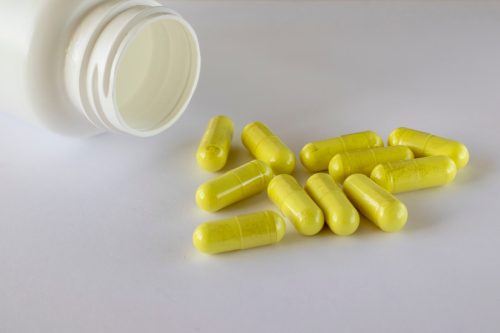
While spring offers a reprieve from cold and flu cases, it also kicks off allergy season. If you struggle with seasonal allergies at this time every year, experts suggest looking into quercetin.
"Quercetin (which is a nutrient also found in many fruits, vegetables, and herbs) is a type of flavonoid that has antioxidant properties," Hilbert says. "Some research has shown [quercetin can] work as a 'mast cell stabilizer' that helps block the release of histamine that causes inflammation, which is associated with many allergic reactions."
Karla Robinson, MD, medical editor at GoodRx, also points to quercetin as a spring addition, noting a May 2020 study that identified the flavonoid as a "good candidate as a supplement for the management and treatment of allergic diseases, especially rhinitis."
However, Hilbert notes that more research is needed on long-term effects—and as with any supplement, don't introduce it to your routine without talking to your doctor first.
"Quercetin shouldn't be mixed with certain other medications and it shouldn't be taken by someone with kidney problems," Robinson cautions.
RELATED: 4 Probiotics That Trigger an Ozempic-Like Weight Loss Effect, Doctors Say.
2
Stop: Vitamin D

Both Robinson and Hilbert point out that in sunnier seasons, you may not need to rely on a vitamin D supplement.
"Depending on your sun exposure and where you live, it's possible for some individuals to stop taking a vitamin D supplement during the springtime if they aren't at risk for deficiency," Hilbert says. "Vitamin D is turned into its active, absorbable form through UV rays that can be hard to come by during the winter months. For those who live closer to the equator, spring sunshine is often effective at giving our body the daily dose of vitamin D it needs."
But, if you spend most of your time indoors or "religiously wear sunscreen," you might want to talk to your physician about whether you should maintain your vitamin D intake throughout the spring and summer, Hilbert adds.
3
Start: Vitamin C
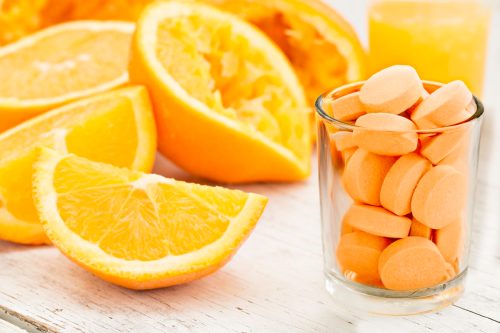
Robinson recommends adding vitamin C during the spring as another way to combat allergies.
"Vitamin C is another supplement that may help treat spring allergy symptoms," she says. "It has anti-inflammatory properties and reduces oxidative stress, which can help alleviate allergy symptoms like nasal congestion."
4
Stop: St. John's wort
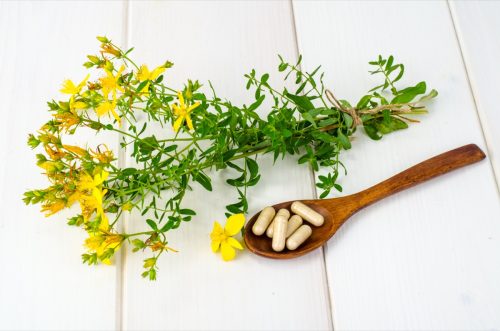
St. John's wort, a flowering shrub native to Europe, is a popular supplement that can treat mild to moderate depression. According to Robinson, it may also be taken to treat seasonal affective disorder (a kind of depression associated with changing seasons). This is most common during winter, meaning that some people may not need to supplement with St. John's wort when more pleasant weather settles in.
"Symptoms of seasonal affective disorder generally go away in the spring when there is more sunlight," Robinson notes. "It's a good idea to stop taking St. John's wort if you don't need it because research is ongoing regarding its safety for long-term use. In some cases, it can have negative side effects when used long-term and dangerous interactions with other medications."
RELATED: 7 Surprising Benefits of Taking Magnesium Every Day.
5
Start: Zinc
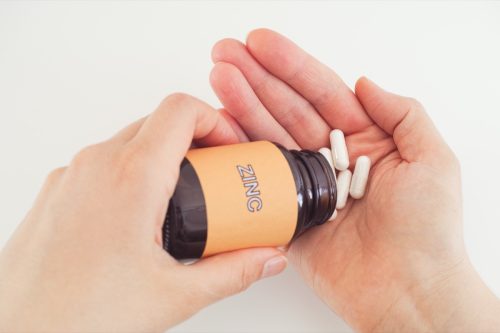
Zinc is another supplement to consider adding to your routine this spring.
"Zinc can also help combat allergy symptoms, and those who have a zinc deficiency have been shown to be more susceptible to pollen allergies, so getting tested for this nutrient can help see if supplementation would be important," Hilbert says.
However, zinc can also "deplete other nutrients" if you take it in high doses or in supplement form over a long period, she warns. In light of this, you may want to consider adding more zinc-rich foods to your diet.
"Good food sources of zinc include whole grains, milk and dairy products, red meat, and nuts/seeds," Hilbert says.
6
Stop: Vitamin A

With the arrival of spring, we also have access to more in-season fruits and vegetables, so you may be able to cut vitamin A supplements and others that support immune health in the winter.
"Getting this nutrition from food is often better absorbed so if we can get [them that way], this is ideal!" Hilbert says. "Fruits and vegetables that are high in important immune-boosting nutrients are bell peppers, strawberries, tomatoes, broccoli, sun-exposed mushrooms, carrots, garlic, etc.—which are all more abundant during springtime."
Hilbert also notes that you can get vitamin C and selenium from these foods, so that's something to keep in mind if you aren't looking to add a new supplement this spring.
RELATED: 4 Major Drug Shortages That Could Affect You in 2024.
7
Start: B vitamins

Rounding out this list of supplements are B vitamins.
"As the weather warms up, it's natural for us to sweat more. Because of this, [it's vital to make] sure we're getting enough electrolytes and B vitamins that can be depleted through excessive sweating," Hilbert says. "Taking a high-quality B complex can help reduce the loss of these nutrients, and as an added bonus, these B vitamins can also help protect the skin from damaging UV rays."
Best Life offers the most up-to-date information from top experts, new research, and health agencies, but our content is not meant to be a substitute for professional guidance. When it comes to the medication you're taking or any other health questions you have, always consult your healthcare provider directly.





